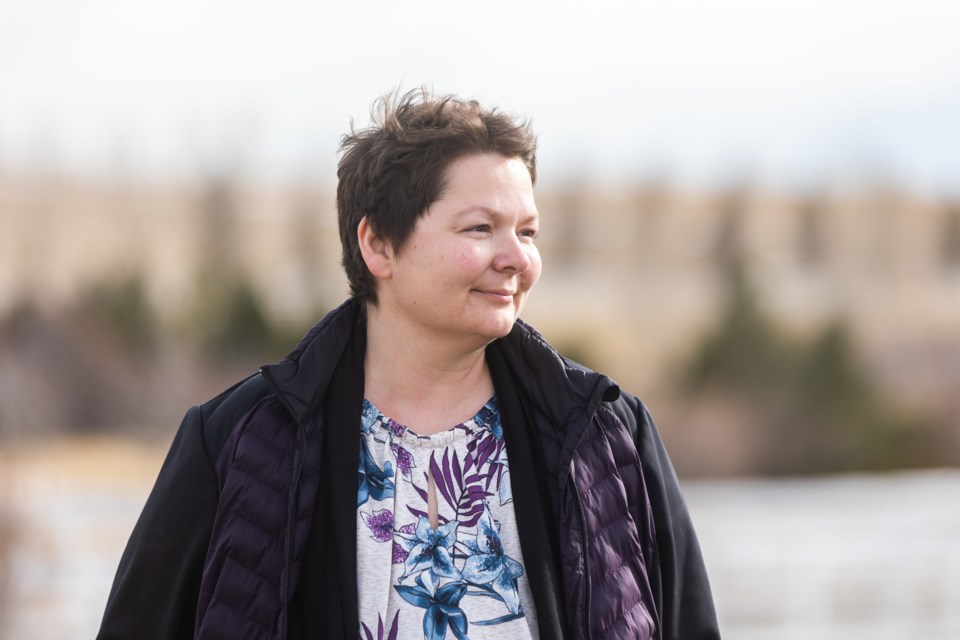Jennifer Mundy knows a thing or two about navigating the health-care system during a pandemic.
The mother of two was diagnosed with breast cancer in November 2020 and in the last year, went through two surgeries along with six rounds of chemotherapy and radiation, leaving her severely immunocompromised.
"Literally, a cold could have killed me at that point. Any type of infection could've kill me," Mundy recalled.
She is now in remission, but is awaiting a preventative surgery that is currently classified as elective given the realities of COVID-19. The Foothills resident expects that it will be anywhere from six months to a year before she will be able to have her procedure.
With the termination of Alberta's Restrictions Exemption Program (REP) on Feb. 9, Mundy worries what another wave could mean for her and those currently in the position she was in months ago.
"The opening up of regulations, while lovely, does make me nervous that the health system is going to become overburdened again and we're just going to be back right where we are," she said, adding that she was lucky to have received her previous surgeries when she did.
As venues and activities continue to become less restricted, she said she won't go out of her way to attend large, crowded events like concerts, but she''ll go to watch her son play basketball and maybe go to a restaurant.
The mask mandate is expected to expire at the end of the month, pending a continued decrease in hospitalizations. Mundy said she plans to continue wearing a mask in public as she awaits her procedure.
"For me, masks have always been, whether I was immunocompromised or not, has always been — in the grand scheme of all that we can do — washing our hands, keeping distance from people, wearing a mask are very simple, easy, actionable items that I don't feel really cause too many issues," she said.
Mundy said the unpredictable timeline for her surgery does take a toll despite the fact that she is currently cancer free.
"My surgery is cancer preventative. So, it is freaky. Every time that I have potential symptoms of the cancer coming back in different body parts it's scary. Is it more scary because I have to wait for the surgeries and stuff? I don't know," she said. "It's just, as a cancer patient and facing your own mortality, it's just scary in general."
Despite her situation, Mundy said she empathizes with those who are tired of restrictions. She noted that no one knows what is going on in other's lives behind closed doors.
"I would never want to judge people for their decisions and why they make those decisions," she said.
Dr. Adam Vyse, a family physician in High River, said he doesn't see the lifting of the REP having a significant impact on the health-care system.
"I'm personally totally fine with ending the REP," he said. "It doesn't look like Omicron transmission is affected much by vaccine status. So, the REP is not preventing transmission so ending that shouldn't have a huge impact on public-health status."
He said the Omicron wave changed everything when it comes to how we perceive test numbers and positivity rates.
"From our point of view, no single piece of data has ever been the sole indicator of what's happening," said Dr. Vyse.
This is especially true for the most recent wave as testing capabilities decreased significantly, given the high rate of transmission.
"I think you [have] to take everything as a whole and what we've seen with Omicron is we don't have the capacity to test everyone, so we're never going to know exactly how many people have it," he said. "We know it's an awful lot and it's probably five to 10 times higher in numbers than it was through any other wave in the last few years."
He said case numbers seem to be irrelevant because the only solid data that can be collected are hospital and ICU admissions, the latter of which have not been nearly as high as previous waves.
"This has been a huge wave of infections but not a huge burden on our intensive care units. Hospitals have been stretched for sure, but we're seeing our numbers coming down locally, so I think starting to plan for lifting of restrictions is a good thing," said Dr. Vyse.
"I think that everybody needs a bit of good news and that from our point of view, starting to think of things optimistically is a really refreshing idea."
The family doctor said he is proud of the community for holding strong through two turbulent years.
"I'm really grateful for the commitment that our general population has had so far through this pandemic in terms of what people have put up with," he said.
Should we be faced with another wave, Dr. Vyse said health measures should only be in place when needed so the public can place trust in their effectiveness.
"I think it's really important to lift restrictions when they're not needed and that way we can trust that when we have to have restrictions again we know there's going to be an end," he added.



